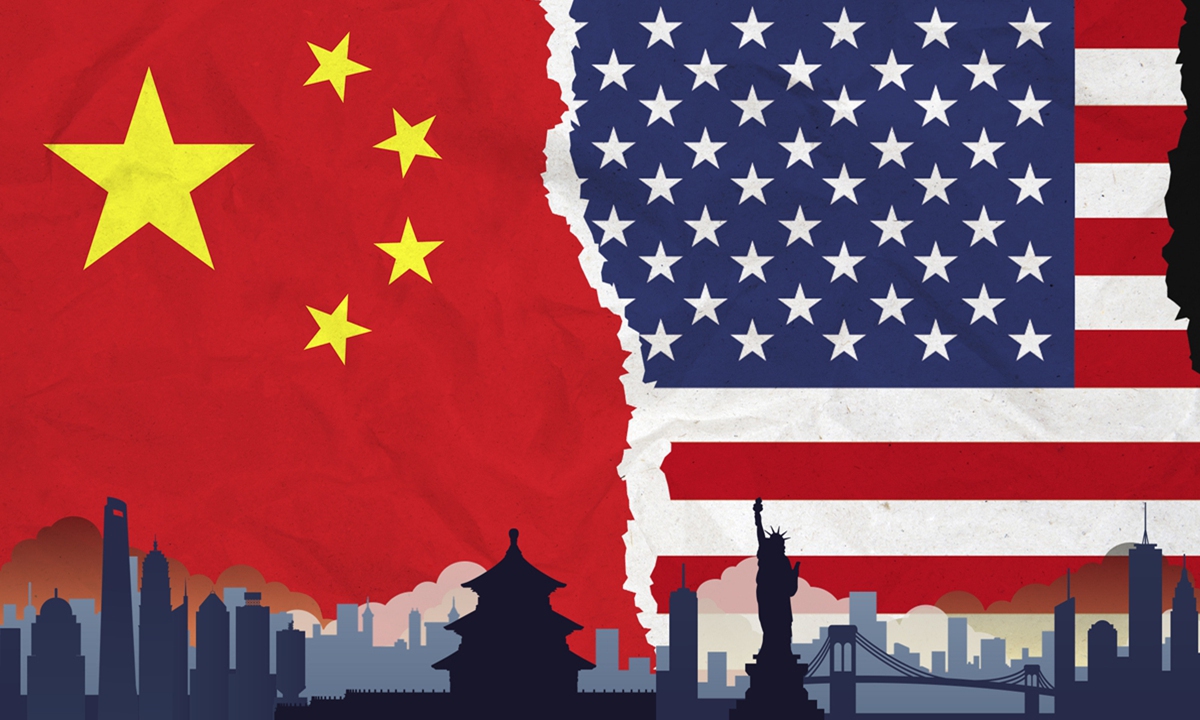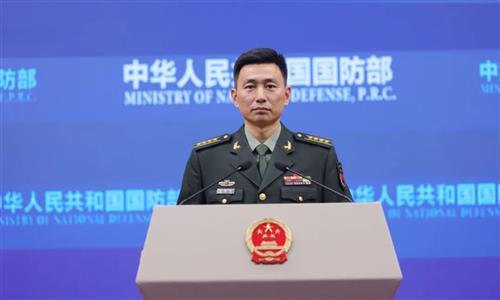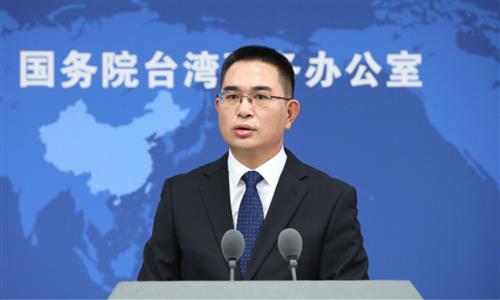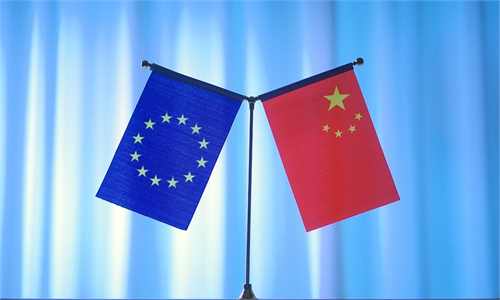China adds 28 US companies to export control list, 10 to unreliable entities list
Actions only target illegal activities, different from US’ arbitrary sanctions: expert

China-US Graphic: GT
China's Ministry of Commerce (MOFCOM) on Thursday announced the inclusion of 28 US entities to the export control list, barring exports of dual-use items to the listed companies. Separately, MOFCOM also announced the addition of 10 US entities to the unreliable entities list over their arms sales to the island of Taiwan.In a statement, MOFCOM said that in line with relevant Chinese laws and regulations and to safeguard China's national security and interests and fulfill non-proliferation and other international obligations, it has decided to impose export control measures on the 28 US entities, including General Dynamics, Boeing Defense, Space & Security and Lockheed Martin Corporation.
Following the move, exports of dual-use items to these 28 US entities are prohibited and any such ongoing export activities related to these entities must be immediately halted, according to the statement. In special circumstances where exports are deemed necessary, exporters must apply for permission from MOFCOM.
A spokesperson for MOFCOM said that the move is aimed at safeguarding national security and interests, and fulfilling non-proliferation and other international obligations.
The Chinese government will continue to unswervingly promote high-level opening-up, firmly safeguard the legitimate rights and interests of various business entities, and promote the development of trade that is in line with regulations, the spokesperson said.
In a separate move on Thursday, MOFCOM announced that in order to safeguard national sovereignty, security and development interests and in line with relevant Chinese laws and regulations, it has added 10 US entities that have participated in arms sales to the Taiwan region, including Lockheed Martin Missiles and Fire Control, to the unreliable entities list.
The listed companies are prohibited from engaging in China-related import or export activities, and are forbidden from making new investments in China. Senior executives of the companies are prohibited from entering China, while their work permits will be revoked, along with their visitor and residential status, and the related applications they submit will not be approved, according to the MOFCOM announcement.
In a separate statement, a spokesperson for MOFCOM said that the Taiwan question is an internal affair of China concerning its core interests and brooks no external interference. The one-China principle is a universally recognized basic norm in international relations and a general consensus of the international community. China has always been firmly opposed to the arms sales by the US to China's Taiwan region, the spokesperson said.
In recent years, the 10 US entities participated in arms sales to Taiwan and carried out so-called military technical cooperation, seriously undermining China's national sovereignty and territorial integrity, gravely violating the one-China principle and the provisions of the three China-US joint communiques, and seriously jeopardizing peace and stability in the Taiwan Straits, the spokesperson said.
China has consistently handled the issue of the unreliable entity list with caution, targeting only a small number of foreign entities that pose a threat to our national security. Foreign entities that operate in good faith and comply with the law have no reason to worry, the spokesperson stated.
The Chinese government welcomes enterprises worldwide to invest and expand their businesses in China, and is committed to providing a stable, fair, and predictable business environment for compliant foreign enterprises operating in the country, the spokesperson added.
Gao Lingyun, an expert at the Chinese Academy of Social Sciences in Beijing, said that the moves are in line with Chinese laws and regulations as well as international trade rules, as they only target trade activities that are in violation of Chinese laws and regulations and harm China's national interests.
"It is important to stress that we have specific regulations and systems, and we take actions in accordance with these regulations and systems. These actions are not taken at will. They are taken because these entities violated laws and regulations," Gao told the Global Times on Thursday, noting that China's moves are different from the US' arbitrary sanctions targeting normal economic and trade activities.
The export controls on the 28 US entities came after MOFCOM in December announced measures to tighten controls on the export of relevant dual-use items to the US. In principle, the export of dual-use items related to gallium, germanium, antimony and superhard materials to the US is not permitted, while stricter examinations on end-users and end-use purposes are to be conducted regarding exports of the dual-use item of graphite to the US, the ministry said at the time.
In May 2024, MOFCOM also added several US companies, including General Atomics Aeronautical Systems and General Dynamics Land Systems, to the unreliable entities list because they sold arms to China's Taiwan region.
Defending interests
Lü Xiang, a research fellow at the Chinese Academy of Social Sciences, said that the US has not only imposed strict restrictions on normal trade and technological cooperation, but has also attempted to interfere in China's internal affairs related to the Taiwan region.
"Therefore, it is imperative for China to take actions against these entities to safeguard China's sovereignty, security and development interests," Lü told the Global Times on Thursday. "The actions are in line with normal international norms as they only target military-related activities."
Chinese authorities have repeatedly slammed the US' interference in China's internal affairs related to Taiwan. On December 22, following the US' announcement of so-called military assistance and arms sales to the Taiwan region, a spokesperson for the Chinese Foreign Ministry said the decision was a severe breach of US leaders' commitment of not supporting "Taiwan independence," and sends a gravely wrong signal to "Taiwan independence" separatist forces.
"The Taiwan question is at the core of China's core interests, and the first red line that cannot be crossed in China-US relations. To aid 'Taiwan independence' by arming Taiwan is just like playing with fire, and to use the Taiwan question to contain China is doomed to fail," the spokesperson said.




